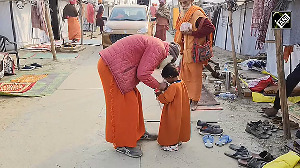India indicated that it was open to liberalising its services sector more than it had offered earlier but sought to link services negotiations at the World Trade Organisation with liberalisation talks on agriculture and industrial tariffs saying the issues could not be dealt with in isolation.
"The attempt to reach a framework agreement on agriculture and non-agricultural market access (Nama) cannot be in isolation to services negotiations. These will have to be a part of the package if consensus is to be reached," S N Menon, special secretary in the commerce ministry, said at a CII conference.
The WTO members, led by the US and the European Union, are trying to work out the framework for negotiations over the next two-three months to put the talks, which collapsed at Cancun last September, back on track. Negotiations are scheduled to be completed by December but differences among key members could mean that the deadline may be missed.
Menon said in keeping with the country's strength and aggressive interests in services, India was also looking at the option of upgrading its preliminary offers even if other countries showed adequate flexibility in their proposals.
India had tabled its offers on services at the WTO in December. It was looking at opening up markets in Mode 1 (cross-border supply like BPOs), Mode 2 (consumptions abroad like tourists consuming services in India) and Mode 4 (through freer movement of natural persons).
Menon said some more clarifications were required before the modalities for negotiations on trade facilitation could be finalised.
Commerce ministry officials said bringing services at par with those in the US and the EU would require huge investments and this would be difficult for developing and least developed countries.
Menon said India was open to clarifications on trade facilitation, especially in the backdrop of the non-tariff barriers and certain implementation issues like customs fraud.
Expressing disappointment over the outcome of the Cancun ministerial, Menon said India was interested in having a healthy and effective multilateral trading system which would provide an institutional backdrop for a process of economic development for all.
He said an important outcome of the Cancun talks was engagement of developing countries in the negotiating process and added that not only had they become participants in the process but had shown adequate flexibility to reach out to other fellow countries to form alliances.






 © 2025
© 2025